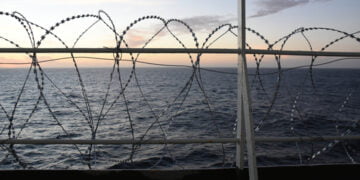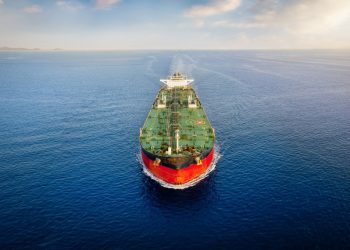TT Club has warned that global tariff strategies have disrupted normal trading patterns and that will, in turn, inevitably increase operational risk in the global supply chain.
During April 2025, US an China begun engaging in an escalating tariff threats. U.S. tariffs on Chinese goods peaked at 145%, while China retaliated with tariffs up to 125% on American imports. However, by mid-2025, both countries agreed to a temporary 90-day reduction of tariffs to ease tensions. Alas, the situation remains volatile: the U.S. accused China of violating recent agreements and responded by doubling tariffs on Chinese steel and aluminum, while China imposed new restrictions on rare-earth exports.
Drawing on insights from several significant disruptive events over the past five years, TT Club has examined potential risk areas and emerging exposures across various sectors. Key considerations relating to the maritime industry, as presented by the Club, include:
#1 Cargo risks
An inevitable consequence of the current global tariff strategy is that some goods already ordered or in transit will be affected. The sale of these goods might already have been finalised and, depending on the INCOTERMS incorporated, may leave certain stakeholders with limited choices when the goods arrive at their destination.
Abandonment of goods is therefore a potential risk, whereby the goods arrive at a destination and are not collected. Detention and demurrage charges will accumulate from both the terminal and container owner, and – depending on the cargo – there are potentially challenging issues around disposal, degradation, and segregation to consider.
Operators need to be aware of the increasing risk of cargo being abandoned and make appropriate contingency plans. For example, where temperature-sensitive cargoes are concerned, the availability of plug in points may need to be considered.
#2 Freight crime
Many shippers will pause in-transit shipments while waiting for certainty or hedging against a potential tariff reduction. This will cause free trade zones and bonded warehouses to reach capacity quickly, requiring additional short-term storage. Many short-term or ‘overspill’ storage locations are less secure than primary storage locations, receiving less investment in CCTV, perimeter fencing and general security provisions. Goods are more likely to be stored outside of secured structures and left in containers and vehicles stored in yards, where they are more vulnerable to thieves. Also, any bottlenecks in the supply chain will be quickly identified by criminals as opportunities to test weaknesses and strike.
These risks are particularly acute in instances where cargo is diverted to smaller ports that have limited capacity to handle large volumes of cargo. Currently, large volumes of goods are being diverted from Port of Los Angeles and Port of Long Beach to smaller ports in Mexico and Canada while businesses wait to move cargo into the U.S. in the hope that tariffs will be reduced soon. These diversions and subsequent backlog of cargo may ease once business has more clarity about the long-term tariff regime but pose a significant risk in the near term.
Shippers and transport and logistics operators need to be aware of the increased risk of freight crime during the current market instability. They should collaborate with their customers and supply chain partners to review all aspects of cargo security.
#3 Port operations
As global trade routes and volumes shift towards a new normal, differing cargo volumes along new routes are likely to result in different ship types and sizes arriving at unfamiliar ports. This places additional pressures on port operations, landside operations and the hinterland the port supports.
The primary risk is that when larger ships arrive, the port’s mooring strategies and infrastructure may not be capable of holding them alongside and servicing them. Availability of local expertise and resources is another risk. If volumes increase sharply, there may for example be insufficient reputable trucking companies to move the cargo inland. Port infrastructure and resources need to be carefully considered before changing shipping routes.
For US-based operators – particularly in the port, terminal, and cargo-handling sector – parts for existing equipment are likely to increase in cost due to the new tariffs. Operators may be tempted to run the risk of running down their inventory of spare parts and pausing preventative maintenance strategies until the economic outlook is more certain. They may also be tempted to extend the budgeted lifecycle of assets.
Instead, they should do everything possible to secure access to spare parts and form a robust strategy to maintain current maintenance and repair programmes. As market dynamics and priorities shift, the availability of spare parts needs to be closely monitored.
#4 Container operations
History suggests that the impacts of globally disruptive events are felt across the container industry, given that it moves 60% of global trade by volume. For example, shippers may hold cargo in containers awaiting certainty and potential easing of tariffs, impacting the availability of empty containers for other cargoes and lead to an uplift in freight costs. Historically, changes in trade routes and volumes have directly affected the positioning and general availability of containers, causing spikes in freight rates.
Lack of availability of containers can be problematic in the context of protecting cargo. Furthermore, if it has taken several days to get an empty container confirmed and positioned for an urgent shipment, it is less likely that the shipper will reject the container based on structural damage, which in turn increases the risk of cargo damage in transit.
Transport and logistics operators need to be prepared for a global shortage of containers and resist the temptation to use sub-standard units.
#5 Safety
As the above issues arise, there will be a growing pressure on operators to cut corners and costs, which in turn is likely to increase the risk of accidents. Congestion and bottlenecks through the supply chain will also give rise to additional safety challenges, with handling equipment and people working in ever-closer proximity.
It is vital that operators do not undermine their safety culture during this period of market turbulence. Decisions should continue be made by the most senior leaders of the organisation and communicated effectively to ensure everybody within the organisation remains on track.
Safety factors can also be introduced through practices related to the shipment of cargo. Goods could for instance be mis-declared, a practice that the Club regularly highlight as increasing risk.
#6 Contractual obligations
Operators should proactively review their contracts with customers and contractors to ensure they are fair and appropriate for the fast-changing business landscape. By using their standard trading conditions, parties will have a greater opportunity to negotiate and protect their interests.
































































